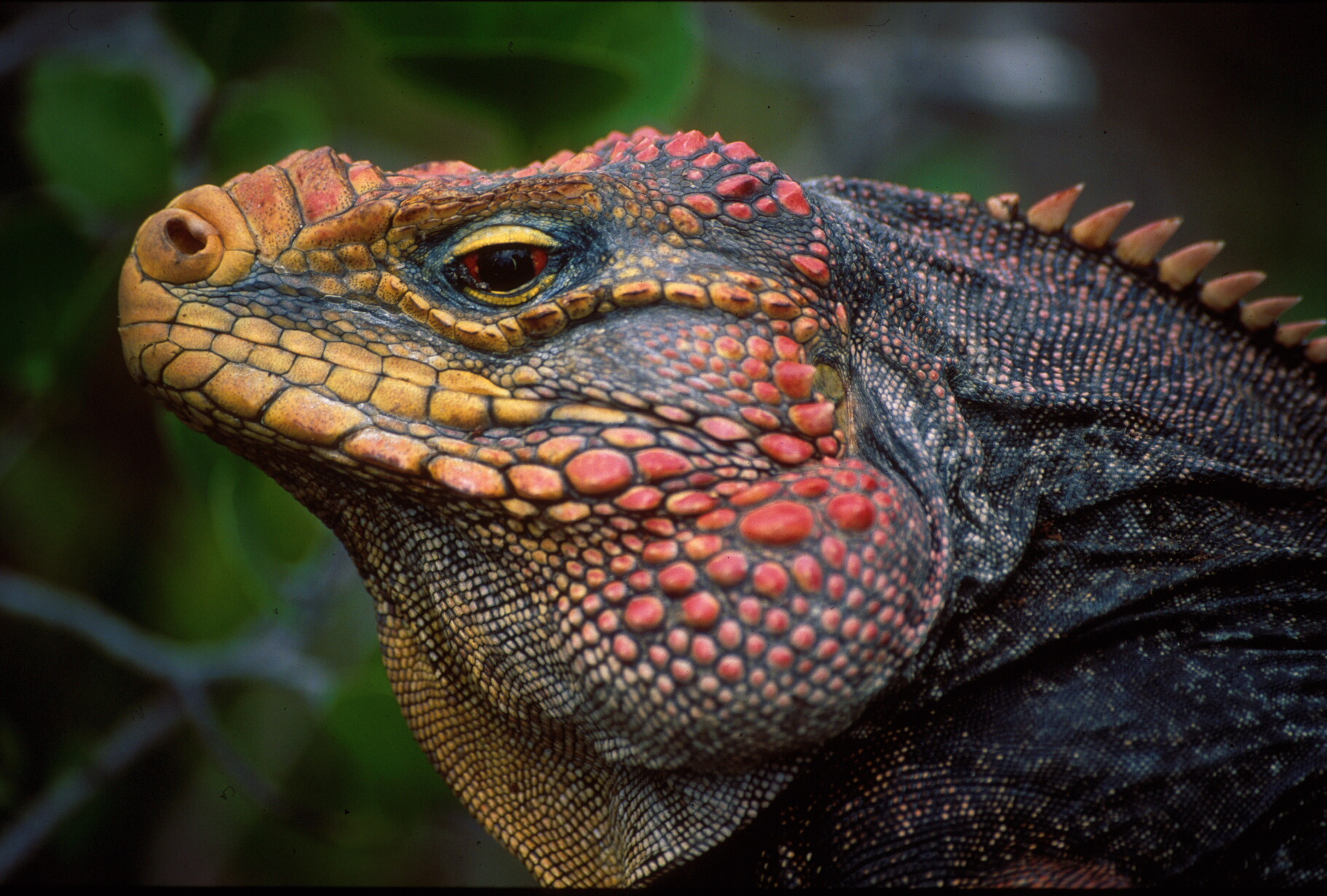
Tropical islands brim with wildlife: brightly feathered and boisterous birds, towering palm trees and, of course, scaly lizards. Scurrying up trees or slipping between twigs and leaves, lizards are thought to be a common sight on most tropical islands. Unfortunately, contrary to popular belief, many lizards are disappearing before our eyes.
Rock iguanas are the largest native land animals in the Caribbean and the Bahamas -- and among the most endangered lizards in the world. Ten species inhabit the rugged terrains of popular tropical islands: Cuba, Hispaniola, Jamaica, the Puerto Rican bank, the Caymans, the Bahamas, and the Turks and Caicos.
The largest native animals on these islands, the vegetarian rock iguanas have peaceably munched leaves and nibbled fruit for millennia. Without natural predators, adult iguanas had little to fear, but their tranquil existence began to change when Amerindians canoed north from South America about one to two thousand years ago and began hunting the lizards for food and possibly transporting them between islands.
The real threat to iguanas arrived in the 16th century on European ships: eager and often overzealous human hunters, habitat destruction, and the arrival of pets and livestock. Today, introduced cats, dogs, hogs, goats and even mongoose gobble up iguana food, trample their nests, and even kill adult lizards. Burgeoning human populations and increased tourism damage or destroy iguana habitat. Once abundant, all ten species of rock iguanas are listed as Vulnerable, Endangered or Critically Endangered on The IUCN, International Union for the Conservation of Nature Red List of Threatened Species.
So what? Why should we care about the plight of rock iguanas? Because our tropical paradises wouldn't be the same without them. As top-level herbivores in their island ecosystems, rock iguanas promote plant growth through repeated pruning, spreadseeds to new areas, and provide nutrients to developing seedlings. As development fragments subtropical dry forests, iguanas help maintain the last patchesof intact habitat, which also support many other native species including birds, mammals, and crabs. Without action, future island visitors may find themselves experiencing an unrecognizable and artificial landscape, paradise no longer.
 At Shedd Aquarium in Chicago, I have grown to love these prehistoric creatures through almost 20 years of research and work in the Bahamas. My passion for them remains unabated, and my initial curiosity has grown into admiration for their physical toughness and steadfast instincts. Rock iguanas thrive in unforgiving hot landscapes of jagged limestone, arid climates, seasonal food scarcity, and severe storms that can flood entire islands. Conditions that leave me panting and sweat-drenched don't faze iguanas. These magnificent animals can be 4 feet long and weigh over 20 pounds, yet they are no match for human impacts.
At Shedd Aquarium in Chicago, I have grown to love these prehistoric creatures through almost 20 years of research and work in the Bahamas. My passion for them remains unabated, and my initial curiosity has grown into admiration for their physical toughness and steadfast instincts. Rock iguanas thrive in unforgiving hot landscapes of jagged limestone, arid climates, seasonal food scarcity, and severe storms that can flood entire islands. Conditions that leave me panting and sweat-drenched don't faze iguanas. These magnificent animals can be 4 feet long and weigh over 20 pounds, yet they are no match for human impacts.
Although the overall outlook for rock iguanas remains tenuous, aquariums and zoos have facilitated inspiring stories of recovery and hope, bringing together communities from around the world to save these important species. The non-profit International Iguana Foundation is primarily an aquarium- and zoo-managed organization that operates an annual small grants program to support endangered iguana conservation. Many aquariums and zoos have boots -- or durable sandals -- on the ground, sending researchers throughout the tropics. We also partner with other conservation biologists, concerned scientists, government officials, and iguana experts in the Iguana Specialist Group (ISG) under the auspices of the globally renowned International Union for the Conservation of Nature (IUCN), Species Survival Commission. The specialist group helps to design and implement immediate, effective plans that can protect this magnificent group of lizards.
Beyond research, aquariums and zoos connect people to animals, sharing meaningful conservation stories that link directly to our field research programs. At Shedd Aquarium, guests learn about our field work while viewing these remarkable animals in our care. In addition to learning how they can help protect rock iguanas, we offer opportunities for the public to participate in Shedd's annual citizen science expedition to the Bahamas aboard the aquarium's research vessel. In the last 14 years, almost 100 adventure-seeking people have directly advanced iguana conservation by getting their hands dirty participating in research in remote parts of Andros Island and the Exuma Islands.
If you can't visit the Caribbean, you may still see one of these remarkable iguanas during a visit to aquariums or zoos that house them, and your support helps ensure their survival. If you are lucky enough to see a lizard in its natural setting, remember that they are protected by local and international laws. Enjoy them from a distance, and resist the temptation to feed them.
Rock iguanas are as integral to these tropical islands as white sandy beaches, lush palms and colorful birds. Above all, these iguanas embody the unique and exotic character of the islands they call home. Together, we can ensure that they remain part of island landscapes for generations to come.
To learn more about participating in the iguana citizen science program, please contact iguanaresearch@sheddaquarium.org.
